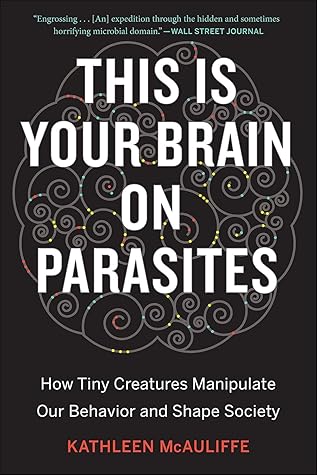More on this book
Community
Kindle Notes & Highlights
Read between
September 19, 2016 - December 22, 2018
Animals traveling in large packs, shoals, or flocks, note Nicolas Rode and Eva Lievens, the French scientists who identified the manipulation, are assumed to do so for their own benefit—for example, to find mates, deter predators from attacking, or enhance foraging strategies. Rode and Lievens think it’s time to reexamine that assumption. Perhaps far more often than we realize, parasites might be herding their current hosts straight into the jaws of their next hosts.
Compared to uninfected men, males who harbored the parasite were more inclined to break rules and were more reserved and suspicious. In contrast to uninfected females, infected women were more likely to abide by rules, and they also tended to have warmer, more outgoing personalities.
By 2011, they had their answer: neurons harboring the parasite were making 3.5 times more dopamine. The chemical could actually be seen pooling inside infected brain cells.
she infected rats with T. gondii and then gave them antipsychotic medicine. Lo and behold, they didn’t develop fatal feline attraction. Suddenly, Flegr’s claims about the parasite changing human behavior no longer seemed so far-fetched.
If you ever get organs from a motorcycle accident death, check the organs for toxo. I don’t know why, but you find a lot of toxo.’”
But gradually, clue by clue, he and his collaborators began to piece together the parasite’s modus operandi. T. gondii travels not only to the brain but also to the testicles, where it bumps up production of testosterone. What’s more, female rats are far more receptive to copulating with infected males. “It’s a very strong effect,” Ajai Vyas, Sapolsky’s postdoc at the time of the discovery, told me. “Seventy-five percent of the females would rather spend time with the infected male.”
Save for the ancient Egyptians, he found, virtually no one kept cats as pets until the latter part of the 1700s. The first people to embrace the practice “were poets—avant-garde, left-wing types in Paris and London, and it just came to be the thing to do.” They called it the “cat craze,” and coinciding with it, the incidence of schizophrenia rose sharply.
So far, the genes that have been most consistently linked to schizophrenia are those that control how the immune system defends against infectious agents. In families with a high incidence of the mental illness, they say, it may be that the risk factor being passed down is an ineffective immune response to the parasite.
Zora liked this
In the first three days after vaccination, coinciding with the time when the virus was most contagious, subjects interacted with twice as many people as they had before being inoculated. “People who had very limited or simple social lives were suddenly deciding that they needed to go out to bars or parties or invite a bunch of people over,” reported Reiber. “This happened with lots of our subjects. It wasn’t just one or two oddities.”
“The animals on lactobacillus learned much better and more efficiently.”
Maybe we’ve underestimated parasites’ political clout. Maybe they permeate our entire worldview. Maybe geopolitics should be taught from a parasite’s point of view.


